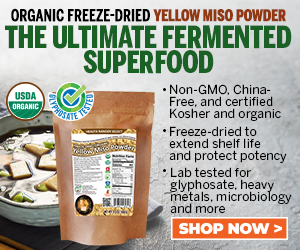
How to avoid GM foods when grocery shopping
Wednesday, October 31, 2012 by: Sarka-Jonae Miller
Tags: GM foods, grocery shopping, avoid
- Newly released JFK files reveal Pentagon's role in creating Lyme disease and covid in the same lab
- Trump nominates VACCINE ZEALOT Susan Monarez to lead the CDC, sidelining RFK Jr.'s reform efforts
- BEWARE: USDA allows genetically engineered vaccines to infiltrate organic food production
- Obama accused of laundering USAID funds to fuel global protest movements, regime change operations
- Festive flavors: The sweet history, nutritional profile and health benefits of pecan pie
- Dr. Mike Yeadon releases 15-minute testimony - WATCH - about genocidal intent of COVID “vaccines”
- Analysis: The coming economic collapse, a mass uprising and Trump's three secret weapons to halt the growing revolt
- Elon Musk: Aliens could be here on Earth RIGHT NOW
- Big Pharma's media takeover: How drug companies bought the news - and your health
- Trump reverses course on Gaza plan, says “nobody is expelling Palestinians”
- Survival 101: Effective EMF blocking techniques
- Rep. Nancy Mace introduces bill to ban biological males from female facilities on federal property
- California's social media censorship law struck down: A victory for free speech or a threat to online safety?
- HUGE: Putin claims 2020 election fraud in U.S. sparked Ukraine war, calls for peace talks with Trump
- Big Pharma's $8 Billion bribery scheme exposed: how doctors are pushed to prescribe junk science, not heal
- Reclaim your health: How midlife exercise reverses years of inactivity
- Chris Rufo finally reveals abuse liberals unleashed on his wife and young kids...
- Pilots report mysterious lights 'moving at extreme speeds' across Oregon skies
- Elon Musk: Aliens could be here on Earth RIGHT NOW
- EPA advisor admits the agency is funneling billions to climate groups ahead of Trump’s return to White House
- Trump reverses course on Gaza plan, says “nobody is expelling Palestinians”
- Reclaim your health: How midlife exercise reverses years of inactivity
- A lack of integrity in Academia: Harvard professor found GUILTY of fraudulent research to promote CRT theory
- Space war brewing? Russia threatens to destroy Starlink satellites
- Big Pharma's $8 Billion bribery scheme exposed: how doctors are pushed to prescribe junk science, not heal
- Mike Adams Sermon 66: God will DESTROY ISRAEL for its wickedness
- Rep. Nancy Mace introduces bill to ban biological males from female facilities on federal property
- Survival 101: Effective EMF blocking techniques
- 5 Simple steps to boost your brainpower: How to strengthen executive function in a distracted world
- Historian warns Israel may be entering an “IRREMEDIABLE DECLINE”
- Florida takes a stand: DeSantis proposes permanent ban on mRNA vaccine mandates
- RFK Jr.'s SSRI antidepressant investigation sparks liberal meltdown, exposes Big Pharma's dangerous game
- New York politicians push bill allowing governor to indefinitely detain the unvaccinated on a whim
- Sales of survival bunkers rise following Russia’s use of the Oreshnik hypersonic ballistic missile
- Pilots report mysterious lights 'moving at extreme speeds' across Oregon skies
- Newly released JFK files reveal Pentagon's role in creating Lyme disease and covid in the same lab
- EPA advisor admits the agency is funneling billions to climate groups ahead of Trump’s return to White House
- The Health Ranger releases “Vaccine Zombie” song and music video, using AI-animated zombies for the music video
- The pandemic as a tool for INDOCTRINATION: Understanding “The Indoctrinated Brain” by Dr. Michael Nehls
- California's social media censorship law struck down: A victory for free speech or a threat to online safety?
- Dr. Mike Yeadon releases 15-minute testimony - WATCH - about genocidal intent of COVID “vaccines”
- Congratulations to the FULLY UNVACCINATED as you resisted the COVID-19 PROPAGANDA MACHINE fueled by over $100 BILLION
- Mike Adams releases country western hit single: Goin’ Back in Time is Comin’ Home
- RFK Jr. clears key hurdle: Sen. Susan Collins backs controversial HHS nominee, signaling a new era for health policy
- Mike Adams releases music poetry sensation: A Child of God
- Mike Adams releases new song and music video: Nothing More Disgusting Than a Globalist
- Unpacking the Lies That We’ve Been Fed – new song and music video released by Mike Adams, the Health Ranger
- Trump administration takes on global censorship: A new frontier for free speech advocacy
- Florida takes a stand: DeSantis proposes permanent ban on mRNA vaccine mandates
- “Why we influenced the 2020 elections”: Facebook files reveal the coordinated effort to bury the Hunter Biden laptop story
- Ex-FBI Chief EXPOSES disgraceful government coverups of Oklahoma City Bombing, Kennedy assassinations, 9/11 WTC, and "Terrorism" as plot to destroy Constitution
- Michigan sheriff announces criminal investigation into 2020 election crimes, Dominion Voting Systems
- Israeli soldiers accused of even more torture and abuse in the West Bank
- Federal judge backs Trump's mass firings, clearing path for government downsizing
- Red Cross issues warning to stop blood plasma donations from vaccinated people
- Scientists confirm: GENIUS brain function can be spontaneously unleashed in humans without any apparent cause
- EPA advisor admits the agency is funneling billions to climate groups ahead of Trump’s return to White House
- HYSSOP: What research reveals about the health benefits of this ancient holy herb
- Two containers with completed ballots fall out of truck in Florida
- Fully vaccinated about to see “tsunami” of illness and death, warns virologist
- Today I asked our AI language model “Neo” about which phytonutrients or phytochemicals can block the spike protein related to SARS-CoV-2 … Here is what it answered…
- Global leaders unite to clamp down on “misinformation” with UN-backed Cascais Declaration
- BREAKING: 2025 NDAA authorizes mandatory military draft of WOMEN across America… as Pentagon pursues global NUCLEAR war with both Russia and China at the same time
- Michael Yon warns of a ZIONIST TAKEOVER in Trump’s second administration
- BOMBSHELL: DNA testing kits are a SCAM to develop ethnic-specific bioweapons
- Ozempic and Wegovy weight loss drugs are injectable LIZARD VENOM PEPTIDES that may unleash a devastating wave of organ failure… side effects align with symptoms of SNAKE BITES
- Israeli soldiers accused of even more torture and abuse in the West Bank
- These 13 countries just signed an agreement to engineer a global FAMINE by destroying food supply
- NASA admits that climate change occurs because of changes in Earth’s solar orbit, and NOT because of SUVs and fossil fuels
- RFK Jr. clears key hurdle: Sen. Susan Collins backs controversial HHS nominee, signaling a new era for health policy
- Sermon 30: How Jesus reveals Caesar’s FAKE CURRENCY and FALSE AUTHORITY
- Coriander seeds: Ancient medicine backed by modern science
GM corn is in everything
Corn is one of the biggest GM food products that threatens consumers. A study published in the Food and Chemical Toxicology journal found that rats fed GM corn developed large tumors. Corn-based ingredients are prevalent in processed foods. Even items like vinegar may be distilled from GM corn.GM corn is a main ingredient in animal feeds given to animals on factory farms. People who eat animal products from factory farms are consuming what the animals ate.
How to avoid GM corn? Avoid processed and packaged foods, conventional meat and dairy, and obvious corn product. Around 12,000 products in the typical U.S. supermarket contain corn. The best way to protect yourself is to buy organic foods labeled as non-GMO. Ironically, organic corn on the cob might be safe while the white vinegar and cookies in the next isle are not.
The other three main offenders
Besides corn, the three main ingredients to watch out for are soy, canola and cotton. The USDA reports that 73 percent of corn crops in the U.S. are genetically modified, as are 75 percent of canola crops, 87 percent of cotton, and 91 percent of soy. Consumers can easily avoid canola oil and make sure their tofu or soy products are labeled non-GMO, but many foods have hidden ingredients. For example, the artificial sweetener aspartame used in diet drinks and some foods as a sugar alternative is made through a fermentation process that includes corn and soy.Cotton may not be an ingredient to worry about when grocery shopping, but it is still found in most homes in clothes, sheets and towels. Some snacks like potato chips may also be fried in cottonseed oil. Cottonseed oil is common in margarine and vegetable oils. Whether people wear it or eat it, GM cotton is a problem.
Analyzing foods
Most dairy products and meats come from animals fed GM corn, soy and canola. Consumers can look for organic labels or those that state that the product is rBST-free. Cows in factory farms are injected with a GM hormone called rBST. This gets into milk, cheese, yogurt, ice cream, butter, and all other dairy products.Many cereals and condiments contain GM ingredients. Organic cereals and condiments are the only ones likely to be safe.
Olive oil is usually not genetically modified, but other oils will contain soy, corn or canola. Most packaged snacks, cookies, crackers and chips are genetically modified.
Bread is also problematic because most contain soy and corn ingredients. Generally, pasta, rice and beans are not genetically modified but packaged dishes could have GM ingredients.
Fresh produce used to be safe, but foods like sweet corn are already GM. Organic produce is safer. Manufacturers are not allowed to label products as "100% organic" if they contain GM ingredients, but they can be labeled "natural," "cage-free," or state that they contain organic ingredients and still be GM.
Staying away from all non-organic and packaged foods is the best way to keep GMOs out of the body.
Sources for this article include:
http://www.voanews.com
http://www.huffingtonpost.com
http://www.motherearthnews.com
About the author:
Sarka-Jonae Miller is a former personal trainer and massage therapist. She has a journalism degree from Syracuse University. Sarka-Jonae currently writes romantic comedy novels and romantic erotica under the same SJ Miller.
Get more health and wellness tips from SJ's natural health Twitter feed or from SJ's Facebook page.
SJ's books can be found on Amazon.
GM foods at FETCH.news
Get independent news alerts on natural cures, food lab tests, cannabis medicine, science, robotics, drones, privacy and more.
Take Action: Support Natural News by linking to this article from your website
Permalink to this article:
Embed article link: (copy HTML code below):
Reprinting this article:
Non-commercial use OK, cite NaturalNews.com with clickable link.
Follow Natural News on Facebook, Twitter, Google Plus, and Pinterest
Science News & Studies
Medicine News and Information
Food News & Studies
Health News & Studies
Herbs News & Information
Pollution News & Studies
Cancer News & Studies
Climate News & Studies
Survival News & Information
Gear News & Information
News covering technology, stocks, hackers, and more



"Big Tech and mainstream media are constantly trying to silence the independent voices that dare to bring you the truth about toxic food ingredients, dangerous medications and the failed, fraudulent science of the profit-driven medical establishment.
Email is one of the best ways to make sure you stay informed, without the censorship of the tech giants (Google, Apple, Facebook, Twitter, YouTube, etc.). Stay informed and you'll even likely learn information that may help save your own life."
–The Health Ranger, Mike Adams












































